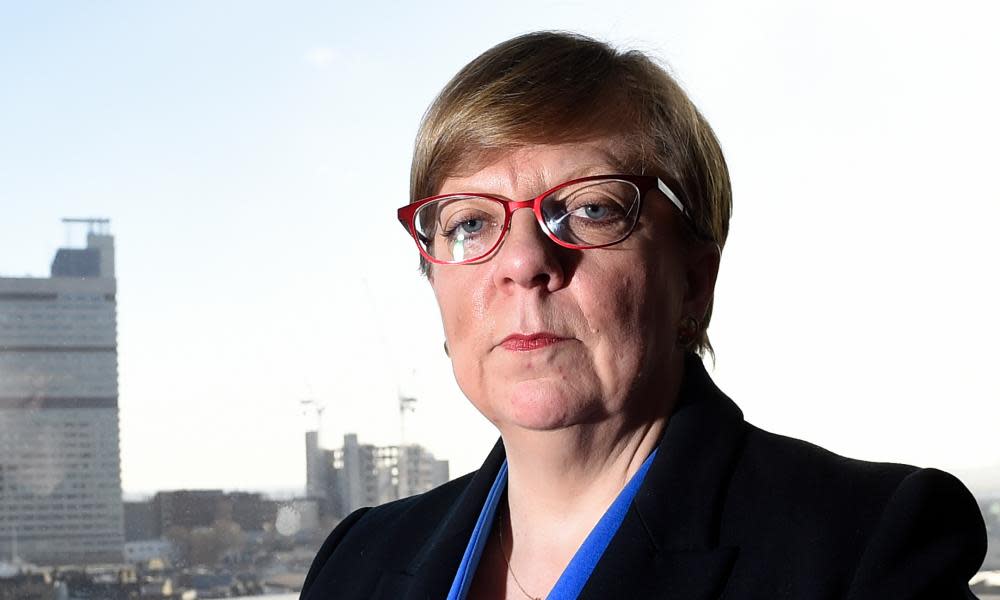Alison Saunders’ departure prompts search for new DPP

The search for a prestigious lawyer to become the next director of public prosecutions has begun after Alison Saunders signalled she would not be extending her five-year term.
The recruitment process for a new head of the Crown Prosecution Service may be portrayed as a quest to revitalise a dispirited organisation or as a battle between competing legal personalities, but its problems run far deeper.
The budget for the CPS, like that of the entire criminal justice system, has plummeted. Staff costs in 2010 were £738m, but by 2016 they had fallen to £291m. Staff numbers have fallen from 7,745 at the beginning of the decade to about 6,000.
Even given the overfall fall in crime, the organisation has been hard-pressed to cope with the surge in the volume of evidence generated in many routine cases by mobile phones and digital equipment that needs to be disclosed to the defence.
As long ago as 2015, the chief inspector of the CPS, Kevin McGinty, said that budget cuts can go too far and “there comes a time when there is no fat left to cut”.
There has been a reluctance by successive DPPs to flag up the extent of the under-funding. The surrounding financial gloom may have discouraged defiance: the Ministry of Justice has endured the heaviest cuts of any Whitehall department since austerity began in 2010. Criminal barristers, however, are planning mass walkouts this month in protest at cuts to their fees.
Saunders was the first internal candidate to lead the CPS and the first not to be a QC. She had previously been chief crown prosecutor for London, overseeing the conviction of the killers of Stephen Lawrence, when she took up the post of DPP in November 2013.
The spin put on her departure by anonymous Conservative sources – that a “clean break was needed” – suggests ministers would prefer to see a pre-eminent barrister take over as DPP.
Holding ultimate responsibility for every controversial decision the CPS takes is never easy and Saunders, like many of her predecessors, has faced calls for her resignation. Criticism of the organisation has been particularly intense over the collapse of a series of rape prosecutions in recent months after police and CPS staff failed to hand over vital material from mobile phones to defence lawyers.
Saunders, like her predecessor, Sir Keir Starmer, has made improving the way sexual assault and rape victims are handled by the criminal justice system one of her top priorities. She has spoken out repeatedly on the need to establish that consent has been obtained in sexual relations between adults.
Saunders, who in 2016-17 earned about £200,000 in salary and an additional £42,000 in pension benefits, will remain in her post until the end of October. She is the second longest serving DPP after Dame Barbara Mills QC, who held the role for six years.
The DPP was appointed Companion of the Order of the Bath (CB) “for services to law and order especially after the 2011 London riots”. Saunders led by example, turning up at Highbury Corner magistrates court in the middle of the night to help process cases.
Speaking to BBC Radio 4’s Today programme, Saunders insisted that during her period in charge of the CPS its performance had improved “despite cuts”. The difficulties experienced over disclosure, she said, had been “extremely regrettable” but part of a “systemic failing across the justice system” that had been going on “for some years”. She said it had been her decision to go.
She will join the City law firm Linklaters. In a comment released where her departure was announced, Saunders explained: “The criminal justice landscape is changing rapidly, as crime trends shift and courts become increasingly digital. Our work is now more complex, with the evolving nature of economic crime, the ongoing terrorism threat and a huge increase in reports of historic sexual abuse.”
The attorney general, Jeremy Wright, thanked Saunders for both her service as DPP and as an accomplished CPS prosecutor.
“In recruiting the next DPP we are looking for an extraordinary candidate. The job requires excellent legal judgment, the ability to lead a large organisation and the capacity to work with others in improving the criminal justice system as a whole,” he said.
The outspoken, former chief prosecutor in north-west England, Nafir Afzal, tweeted: “To all kind souls asking me to be the next DPP – No thank you. I wouldn’t be allowed to say budget cuts are damaging justice. I wouldn’t be allowed to engage more with public we serve I wouldn’t be allowed to criticise police & courts when needed. Role is not independent – it must be.”

 Yahoo News
Yahoo News 
